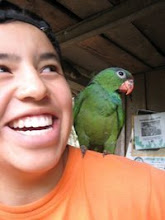As often happens when I´m at the office, I arrive, I get focused, I start computer work… and then I get distracted. My coworkers stop by my desk to talk, visitors are always walking in and out, or I visit my counterpart´s office and we end up having long crazy conversations. This might sound highly unproductive to the average Westerner, and it certainly felt that way to me at first. But once I settled into the laid-back rhythm, I realized that I very much enjoy the extra interactive personal time that is an essential part of Salvadoran work culture. Don´t get me wrong, I definitely get my work done, but at my office, there is always time for another coffee break.
The second big project with which I am involved focuses on many aspects of sustainable agriculture. I and my coworkers give technical trainings on organic alternatives to the purchase and use of chemical fertilizers, herbicides and pesticides, as well as discussions about community organization. We meet with community leaders, who then pass on the trainings to members of their communities. The over-arching goal is to achieve food security in the area.
Legumes are the family of pod-producing plants that include beans, peanuts, and lentils. In the world of organic agriculture, they are known for their ability to add Nitrogen to their soil environment, an essential nutrient for all plants. At the moment we are trying to integrate the use of Jack-bean or "Canavalia" into local agricultural methods. Though we had read that Canavalia is able to fix about
One day, after discussing this lack of knowledge with my counterpart at work, I found myself attending to the tiny garden at the back of our office. Some coworkers had tried to grow corn there, but only a few scraggly plants persisted in the poor soil, along with a scraggly lemon tree. As an experiment, we planted 10 Canavalia seeds around the lemon tree. We intend to observe any changes in lemon quality and overall tree health as a way to measure the effects and timing of the use of Canavalia. And after the planting, we collected lemons together, took them to the office kitchen, and made lemonade.
This story really demonstrates my office atmosphere – we can take the time to plan and execute a little science experiment and afterwards take a pre-lunch break to make lemonade. It also reminds me of so many things that I´ve enjoyed about working in the agricultural field:
- the hands-on work is just as important as the computer work, and way more fun
- farmer innovation is amazing
- agriculture facilitates crucial cross-cultural bonding, especially when
- there is always food involved

1 comment:
You are doing great staff Elsita. Nice to visit your blog. Lydia
Post a Comment